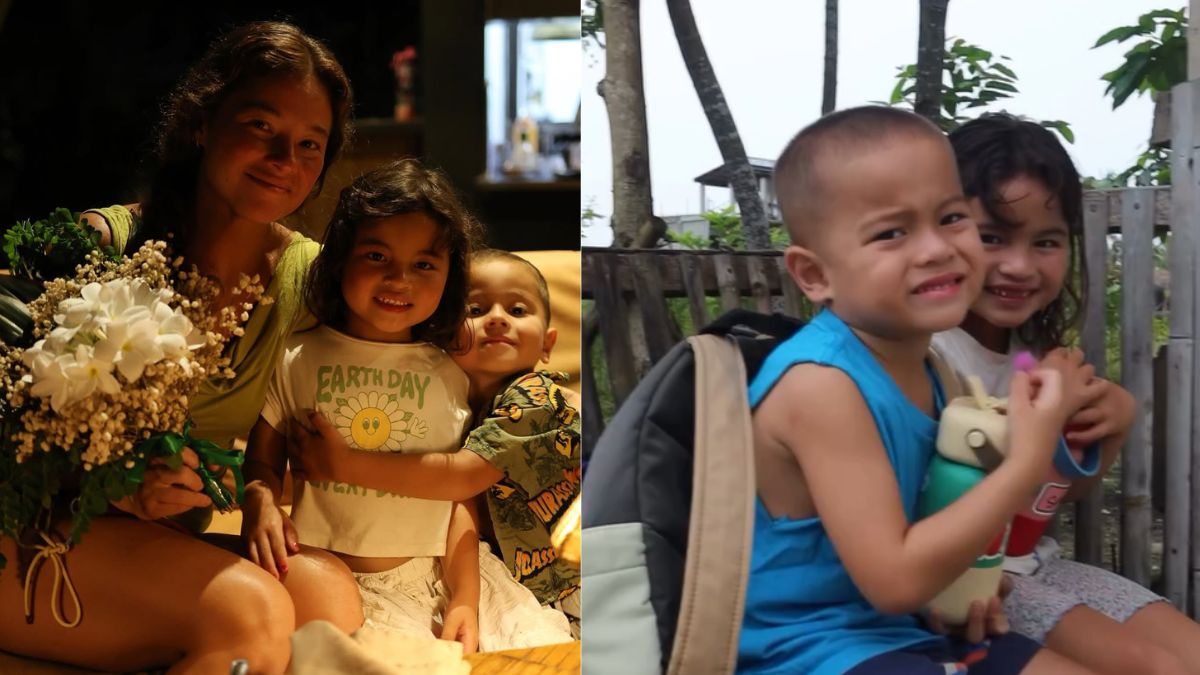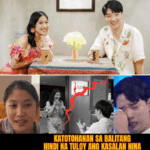
Let Them Be Kids: How Andi Eigenmann’s Bold Defense of Her Children Sparks a Conversation About Real Childhood and Online Criticism
Introduction
In a digital age where every moment is photographed, every parenting choice is scrutinized, and every child’s appearance is a potential talking point, actress and island mama Andi Eigenmann recently found herself at the center of a heated online discussion. The reason? A video she posted on social media — showing her children joyfully walking to school on the island of Siargao — drew criticisms from some netizens, who described her kids as “madungis” or “dirty.”
Rather than remain silent, Andi spoke up — and in doing so, she didn’t just defend her children. She reignited an important conversation about childhood, parenting values, the influence of social media, and the judgment that mothers and fathers face every day in the public eye.
The Incident: A Simple Video Turned Viral Talking Point
It all started with what should have been an innocent and heartwarming moment. Andi posted a video of her two young children, Lilo and Koa, walking to their preschool in Siargao. The children, dressed in casual island clothes, stopped to pick flowers on the dirt path, smiling, barefoot, and carefree — a scene straight out of a nostalgic postcard of rural Filipino life.
Her caption read:
“Any path becomes an adventure when you choose to enjoy it!”
However, the joy was short-lived for some viewers. A handful of netizens left comments calling the children “madungis” — a term often associated with being messy, unkempt, or dirty.
In an age of filtered family photos and “Instagram-perfect” parenting, it seemed that a few smudges of dirt and tousled hair were enough to spark criticism. But Andi wasn’t about to let that slide.
Andi’s Response: A Powerful Message to Her Critics
Taking to her Instagram Stories, Andi offered a calm but firm response that was as honest as it was unapologetic. She addressed the criticism with clarity and purpose:
“The amount of people who comment about my kids looking madungis are most likely the same type of people who have children stuck on their iPads all day, eating fast/junk food for all three mealtimes (and probably more), and then throw huge fits whenever things don’t go their way.”
She added:
“No parent is perfect, but I’d rather mine be messy from living fully than clean from sitting still and being disconnected from it.”
This statement resonated with thousands of followers, especially parents who understand that a bit of dirt isn’t a flaw — it’s a sign of play, growth, and learning.
Why the Word “Madungis” Stung
In Filipino culture, cleanliness and personal appearance are often closely tied to discipline and good upbringing. The word “madungis” carries a subtle judgment — implying a lack of care, perhaps even negligence. It’s the kind of word that can shame both the child and the parent in one swift sentence.
By using it in reference to Andi’s children, critics weren’t just commenting on how they looked — they were implicitly questioning her parenting choices, lifestyle, and priorities.
But Andi’s family doesn’t live a typical city life. They’ve made a home in Siargao, where nature is part of daily life, where barefoot play is common, and where the values of connection, simplicity, and freedom take precedence over appearances.
Redefining Childhood in a Filtered World
In defending her children, Andi made an even bigger statement: children are meant to get messy. They are meant to run, climb, fall, explore, and yes — sometimes show up to school with dirt on their feet and smiles on their faces.
Her parenting style embraces:
Outdoor exploration over screen time
Unstructured play over rigid schedules
Presence over perfection
Andi’s lifestyle is an invitation to reclaim the kind of childhood many of us remember but rarely see online — one that is rich in texture, experience, and freedom.
The Larger Problem: Mom-Shaming on Social Media
Andi’s experience isn’t isolated. Across social platforms, parents — especially mothers — are constantly under the microscope. From how they feed their children, to how they dress them, to the cleanliness of their homes, every detail is up for debate.
This culture of “mom-shaming” has become normalized. But what’s often forgotten is that behind every post is a real person, doing their best in a world that rarely offers grace.
When public figures like Andi push back, they don’t just defend themselves — they speak for thousands of unseen parents who feel judged for not fitting an impossible standard.
What Science Says: Dirt Might Be Good for Kids
Interestingly, Andi’s approach isn’t just grounded in intuition or island values — it’s backed by research.
Exposure to natural environments has been linked to better emotional regulation, reduced anxiety, and improved attention spans in children.
Physical play and exploration help build motor skills, creativity, and resilience.
And yes, a little dirt isn’t dangerous — it might even help strengthen the immune system, according to various studies on the “hygiene hypothesis.”
In short, the very things Andi is being criticized for are actually signs of healthy childhood development.
Parenting Without Performance
There’s a quiet revolution happening in modern parenting: a shift away from performance and towards authenticity. Parents are slowly realizing that perfection is not the goal — connection is.
Andi’s decision to raise her children in Siargao — away from the noise of the city and the spotlight of showbiz — was rooted in that principle. In her words, she wanted her children to live “a simple, happy, and grounded life.”
Her post, and the criticism that followed, became an unexpected reminder of how far we’ve drifted from accepting imperfection as part of life, especially when that imperfection comes from a child simply being a child.
Netizens React: Support and Solidarity
After Andi shared her response, the tide quickly turned. Thousands of fans, fellow parents, and even public figures rallied behind her, applauding her courage, her honesty, and her refusal to conform to unrealistic standards.
Some of the most common comments included:
“Let them be madungis, pawisan, but happy.”
“This is what real childhood looks like.”
“Andi is raising strong, confident kids who will thrive in the real world.”
It became clear that many parents are hungry for this kind of parenting representation — raw, real, and rooted in values that matter more than appearances.
Conclusion: Let Children Be Children
In an unexpected twist, what started as an innocent video of two kids walking to school became a mirror held up to society — asking us what we really value in childhood and parenting.
Andi Eigenmann’s response wasn’t just a defense — it was a declaration. That her children’s joy matters more than their image. That messiness is a badge of exploration. That being “madungis” is a sign of life well-lived — not a parenting failure.
In her own island way, Andi reminded us of something powerful: Children don’t need to be polished; they need to be present. They don’t need perfection; they need permission — to play, to explore, and to live freely.
And maybe, just maybe, we need to be a little more madungis too.
Related Articles
Why “Messy Kids” Are Happy Kids: Reclaiming Childhood in the Digital Age
How Andi Eigenmann Found Peace Raising Her Kids in Siargao
The Rise of Conscious Parenting: Authenticity Over Aesthetics
Mom-Shaming on Social Media: When Judgment Replaces Support
Let Them Get Dirty: What Science Says About Nature Play and Health
News
Ryan Bang Heartbroken Over Breakup With Paola Huyong: A Love Story That Ended Too Soon (NH)
Ryan Bang Heartbroken Over Breakup With Paola Huyong: A Love Story That Ended Too Soon Introduction In the world of…
Paola Huyong Speaks Out About Split With Ryan Bang and Why Their Wedding Won’t Push Through (NH)
Paola Huyong Speaks Out About Split With Ryan Bang and Why Their Wedding Won’t Push Through Introduction The entertainment industry…
Lovi Poe Publicly Confirms Pregnancy: Excited to Welcome Her First Baby (NH)
Lovi Poe Publicly Confirms Pregnancy: Excited to Welcome Her First Baby Introduction Filipino actress and singer Lovi Poe has officially…
The Truth Behind the Rumors: Ryan Bang and Paola Huyong’s Wedding Called Off? (NH)
The Truth Behind the Rumors: Ryan Bang and Paola Huyong’s Wedding Called Off? Introduction Ryan Bang, a well-loved Korean-Filipino TV…
Ryan Bang and Paola Huyong: Wedding Called Off Amid Confirmed Breakup (NH)
Ryan Bang and Paola Huyong: Wedding Called Off Amid Confirmed Breakup Introduction The entertainment world was abuzz with news surrounding…
Korina Sanchez’s Critique of Mayor Vico Sotto and the Controversial Flood Control Projects: An In-Depth Analysis (NH)
Korina Sanchez’s Critique of Mayor Vico Sotto and the Controversial Flood Control Projects: An In-Depth Analysis Introduction In recent…
End of content
No more pages to load












